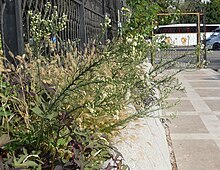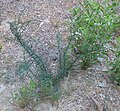| Erigeron bonariensis | |
|---|---|

| |
| Scientific classification | |
| Kingdom: | Plantae |
| Clade: | Tracheophytes |
| Clade: | Angiosperms |
| Clade: | Eudicots |
| Clade: | Asterids |
| Order: | Asterales |
| Family: | Asteraceae |
| Genus: | Erigeron |
| Species: | E. bonariensis |
| Binomial name | |
| Erigeron bonariensis L. | |

| |
| Occurrence data from GBIF | |
| Synonyms | |
Synonymy
| |
Erigeron bonariensis is a species in the family Asteraceae, found throughout the tropics and subtropics as a pioneer plant; its precise origin is unknown, but most likely it stems from Central America or South America. It has become naturalized in many other regions, including North America, Europe and Australia.
Common names of E. bonariensis include flax-leaf fleabane, wavy-leaf fleabane, Argentine fleabane, hairy horseweed, asthma weed and hairy fleabane.
Description
Erigeron bonariensis grows up to 75 cm (29.5 in) in height and its leaves are covered with stiff hairs, including long hairs near the apex of the bracts. Its flower heads have white ray florets and yellow disc florets. It can easily be confused with Erigeron canadensis, which grows taller, and E. sumatrensis.
It flowers in August and continues fruiting until the first frosts. It is instantly recognisable by its blue-green foliage, very narrow, undulate stem-leaves, and purple-tipped involucral bracts. It reproduces only by seed, which are easily blown and spread by wind.
Distribution and habitat
Erigeron bonariensis is found throughout the tropics and subtropics as a pioneer plant; its precise origin is unknown, but most likely it stems from Central America or South America. It has become naturalized in many other regions, including North America, Europe and Australia.
E. bonariensis is a rare alien in southeastern England, found along walls and in cracks in pavements and concrete driveways. It is widespread throughout Australia, where it thrives on roadsides, fallows, pastures, gardens, lawns, footpaths, parks, riparian vegetation, forest and wetland perimeters, waste dumps and disturbed grounds.
Photographic Description
Dry Summer Form
- The following are bright dry summer 1st-year forms; in contrast to shady damp winter forms that follow.
-
 General view
General view
-
 Top-heavy greyish gangly look with initial central inflorescence subsequently overtopped by some side ones
Top-heavy greyish gangly look with initial central inflorescence subsequently overtopped by some side ones
-
 Broad heads (may be narrower especially in winter) usually with reddened tips
Broad heads (may be narrower especially in winter) usually with reddened tips
-
 Head close up
Head close up
-
 Leaf narrow showing hairs
Leaf narrow showing hairs
-
 Leaf surface hairs (similar underside), sometimes poorly hairy
Leaf surface hairs (similar underside), sometimes poorly hairy
-
 Hairs at leaf tip
Hairs at leaf tip
-
 Leaf base hairs (a few long ones usually present) and underside hairs
Leaf base hairs (a few long ones usually present) and underside hairs
-
 Stem leaves of robust stems multi-lengthed, grey (sometimes green)
Stem leaves of robust stems multi-lengthed, grey (sometimes green)
Winter, Damp, Shady, Biennial Forms
- Showing diffusely branched or strangled appearances with small flower heads
-
 Winter form near water in the open
Winter form near water in the open
-
 Strangled winter form in the open
Strangled winter form in the open
-
 Winter form in damp shade
Winter form in damp shade
-
 From a biennial form
From a biennial form
-
 May have particularly reddened heads
May have particularly reddened heads
Other photos
-
 Erigeron bonariensis growing as a weed on a building in New Delhi, India
Erigeron bonariensis growing as a weed on a building in New Delhi, India
-
 Stiff hairs cover the plant.
Stiff hairs cover the plant.
-
 Basal rosette leaves, before plant matures and flowers, Maui, Hawaii
Basal rosette leaves, before plant matures and flowers, Maui, Hawaii
-
 Foliage becomes grey-green in dry-summer regions, such as Israel
Foliage becomes grey-green in dry-summer regions, such as Israel
-
 White ray flowers and yellow disc flowers in fully "open" flower heads, Maui, Hawaii
White ray flowers and yellow disc flowers in fully "open" flower heads, Maui, Hawaii
-
 Flower heads are followed by seeds, which are easily carried by the wind.
Flower heads are followed by seeds, which are easily carried by the wind.
References
- Tropicos, Erigeron bonariensis L.
- "Conyza bonariensis". Germplasm Resources Information Network. Agricultural Research Service, United States Department of Agriculture. Retrieved 18 December 2017.
- Conyza bonariensis, International Environmental Weed Foundation
- Flora of China, Erigeron bonariensis L. 1753. 香丝草 xiang si cao
- Comprehensive profile for Conyza bonariensis Archived 2006-11-10 at the Wayback Machine, Malta Wild Plants
- Conyza bonariensis, Flowers in Israel
- Altervista Flora Italiana, Cespica di Buenos Aires, Erigeron bonariensis L. includes photos and European distribution map
- Tall Fleabane by Agriculture of Victoria
- Brisbane City Council Weed Identification Tool